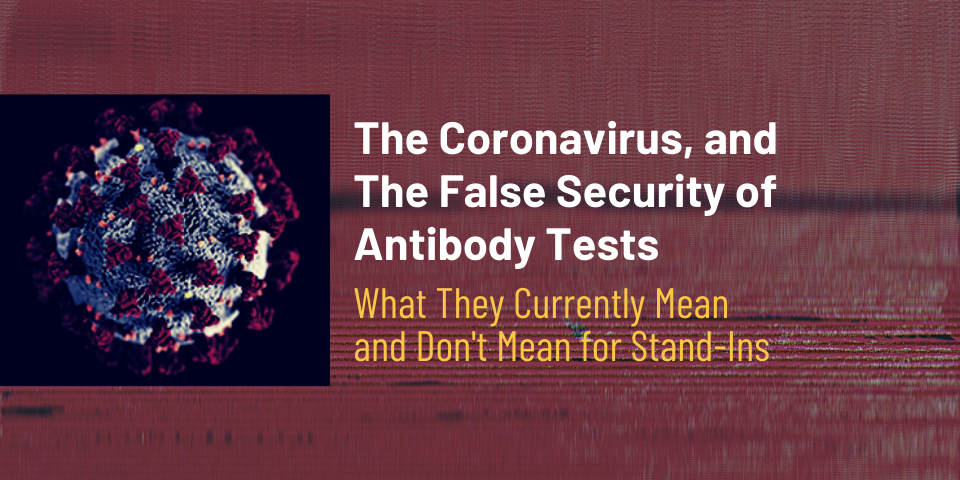Below is some medical information. The author has aimed to link to sources wherever possible. Rather than rely on this information outright, consult your doctor.
— The Editor
Stand-ins in New York City have recently been able to get access to coronavirus tests and coronavirus antibody tests.
For example, around April 28, 2020, CityMD locations were making these coronavirus-related tests available by walk-in appointment. Reportedly, more recently CityMD is administering both of these tests to patients (rather than just one or the other) on recommendation of the New York State Health Department. For those with health insurance from the SAG-AFTRA Health Plan, the tests are free and with no co-pay.
Obviously, testing is a helpful tool for managing public health and public safety, not to mention one’s own personal health. While a test for coronavirus may be helpful for someone with or without symptoms of COVID-19, a coronavirus antibody test may seem the more hopeful for the stand-in and others looking to return to work in TV and film.
However, coronavirus antibody tests are far from being a “ticket” to returning to work. The layperson may think that a positive coronavirus antibody test means that a) the person had been prior infected by the novel coronavirus, and b) the person is now immune to that coronavirus. Similarly, a layperson may think that a negative coronavirus antibody test means that c) the person has not been infected by the novel coronavirus.
All of these — a), b), and c) — are not necessarily true. So in this week’s post on Stand-In Central, we’re going to dig a little into the meanings of coronavirus antibody test results, in case stand-ins are thinking they are the pathway to get back to work.
Straight from the Horse’s Mouth
Coronavirus antibody test results from CityMD give not only an indication of testing positive or negative for antibodies; they also give some perspective on the antibody test itself.
The antibody test involves drawing approximately 1 mL of blood at CityMD. Apparently, the blood is shipped to Quest Diagnostics, which performs the antibody testing.
Along with the test results, CityMD included (around the beginning of May) the following paragraphs:
Detection of IgG antibodies may indicate exposure to SARS-CoV-2 (COVID-19). It usually takes at least 10 days after symptom onset for IgG to reach detectable levels. An IgG positive result may suggest an immune response to a primary infection with SARS-CoV-2, but the relationship between IgG positivity and immunity to SARS-CoV-2 has not yet been firmly established. Antibody tests have not been shown to definitively diagnose or exclude SARS-CoV-2 infection. Diagnosis of COVID-19 is made by detection of SARS-CoV-2 RNA by molecular testing methods, consistent with a patient’s clinical findings.
This test has not been reviewed by the FDA. Negative results do not rule out SARS-CoV-2 infection particularly in those who have been in contact with the virus. Follow-up testing with a molecular diagnostic should be considered to rule out infection in these individuals. Results from antibody testing should not be used as the sole basis to diagnose or exclude SARS-CoV-2 infection or to inform infection status. Positive results could also be due to past or present infection with non-SARS-CoV-2 coronavirus strains, such as coronavirus HKU1, NL63, OC43, or 229E. This test is not to be used for the screening of donated blood.
Reading these passages, it is clear that this coronavirus antibody test and its results should be viewed with a lot of important caveats.
Pulling Some Teeth from the Horse’s Mouth, Part I
Looking at the first paragraph, CityMD says that “Detection of IgG antibodies may indicate exposure to SARS-CoV-2 [the novel coronavirus].” It is important to note that CityMD does not determinatively say that detection of IgG antibodies definitively indicates exposure to the novel coronavirus. The presumption is that one could test positive for IgG antibodies (“have a positive test result for coronavirus antibodies”) but also no exposure to the novel coronavirus.
CityMD then says, “It usually takes at least 10 days after symptom onset for IgG to reach detectable levels.” This means that you could currently be infected by the novel coronavirus, and be infected (or at least symptomatic) for up to 10 days before you would show a positive result for coronavirus antibodies. In other words, you could have the virus but test negative for antibodies.
Next, CityMD says, “An IgG positive result may suggest an immune response to a primary infection with SARS-CoV-2, but the relationship between IgG positivity and immunity to SARS-CoV-2 has not yet been firmly established.” This passage makes an important point. The latter half explains that just because you test positive for coronavirus antibodies, that positive result does not definitely mean (as far as we know to date) that you have any sort of immunity to the novel coronavirus. Instead, as far as we know to date, such a positive result may, at best, suggest an immune response to an infection by the novel coronavirus. That suggestion is far from a certainty. In other words, as far as we know right now, you could have antibodies but not be immune to the novel coronavirus.
To drive home the point, CityMD says, “Antibody tests have not been shown to definitively diagnose or exclude SARS-CoV-2 infection.” So, you could have been infected by the novel coronavirus, but this antibody test at CityMD will not decisively determine that as a fact. Nor will it decisively exclude whether you have been infected by the novel coronavirus. Making a conclusion whether or not you were infected by this antibody test would be wrong-headed.
And to that point, CityMD says, “Diagnosis of COVID-19 is made by detection of SARS-CoV-2 RNA by molecular testing methods, consistent with a patient’s clinical findings.” This is to say that one’s symptoms that coincide with those of COVID-19 can only be definitely determined as caused by the novel coronavirus by detection of the virus’s genetic material through molecular testing.
In other words, if you truly wanted to find out whether you had the novel coronavirus, the antibody test is not the way to do it. Rather, you would want to get molecular testing (rather than this “serological” test).
Pulling Some Teeth from the Horse’s Mouth, Part II
Looking at the second paragraph, CityMD says, “This test has not been reviewed by the FDA.” This is perhaps something to strongly remember. While review by the U.S. Food & Drug Administration of this test may actually turn out to be supportive, it might also turn out not to be supportive. Whatever the case, whenever you report your findings to others, it might be relatively important also to explain that the test from which these findings were made has not been reviewed by the FDA.
* Update 5/13/2020: Shortly before publication, Stand-In Central found out that CityMD now uses new copy (see the toggle above). The new copy no longer says the test has not been reviewed by the FDA. What seems to replace that language is that now the FDA has authorized the coronavirus antibody test at CityMD and performed by Quest Diagnostics for emergency use by authorized labs.
CityMD continues: “Negative results do not rule out SARS-CoV-2 infection particularly in those who have been in contact with the virus.” While this sentence seems to repeat some of the information in its preceding paragraph, it seems to add more information that people who have been in contact with the novel coronavirus and show negative antibody tests may still have been infected. CityMD adds: “Follow-up testing with a molecular diagnostic should be considered to rule out infection in these individuals.” This is to say the advice is that when a person has a negative antibody test but clearly was in contact with the novel coronavirus, a molecular test should be performed for novel coronavirus genetic material.
Almost reiterating, CityMD then says, “Results from antibody testing should not be used as the sole basis to diagnose or exclude SARS-CoV-2 infection or to inform infection status.” By this point, nothing new here.
And climatically, CityMD explains just how inconclusive this coronavirus antibody test can be: “Positive results could also be due to past or present infection with non-SARS-CoV-2 coronavirus strains, such as coronavirus HKU1, NL63, OC43, or 229E.” This is to say that the coronavirus antibody test at CityMD and performed by Quest Diagnostics reports on the presence of any coronavirus antibodies, not just antibodies for the novel coronavirus SARS-CoV-2, which is the foundation of the current pandemic. So while you may test positive for coronavirus antibodies, that does not mean you had COVID-19 or even infection by the novel coronavirus. It could just so happen you had a common cold that was a coronavirus.
Lastly, CityMD adds: “This test is not to be used for the screening of donated blood.”
Looking Inside the Horse’s Mouth
Doing some research, it appears that Quest Diagnostics performs a laboratory-based immunoassay (as distinguished from a rapid diagnostic test (RDT)). The one it performs is called the SARS-CoV-2 Serology (COVID-19) Antibody (IgG), Immunoassay. It has a Test code of 39504, and the test is abbreviated “SARS CoV 2 AB IGG.”
In a brochure about its tests, Quest Diagnostics describes their coronavirus antibody test in this way:
SARS-CoV-2 Serology (COVID-19) Antibody (IgG), Immunoassay test is a qualitative test to detect IgG antibodies to the SARS-CoV-2 virus in your blood. IgG antibody testing should be performed to help identify people who may have been previously exposed to SARS-CoV-2 and may indicate prior infection which may be resolved or is still resolving, and/or protection against re-infection (“protective immunity”).
When reading that passage, one should be careful to respect the intentional use of the phrases “help identify,” “may have,” and “may indicate.” In other words, these tests are not conclusive in and of themselves, but rather are potentially helpful when used along with other diagnostic findings.
Quest’s test is for IgG antibodies. These antibodies can be distinguished from IgM antibodies.
- When infected, a human will often quickly produce IgM antibodies. Detection of IgM antibodies thus implies a very recent infection, perhaps in the last two weeks.
- Later, a human will produce IgG antibodies. Detection of IgG antibodies implies an infection some time ago, perhaps two weeks ago or longer.
This information could be used to imply that if one has a positive SARS CoV 2 AB IGG test, then that the person was infected some time ago with a coronavirus, rather than more recently.
However, that positive test result should not be assumed as a determination of infection by the novel coronavirus — for one, it could just be that the person was infected by another coronavirus some time ago that led to the production of IgG antibodies.
Problematic Results from the Antibody Tests
There are a number of potential factors that could complicate coronavirus antibody test results, making the information they provide even more troubling for the stand-in (or employer or a stand-in) seeking a magic bullet of protection and invincibility back on the job.
Quest Diagnostics’ more public-facing name from its coronavirus antibody test appears to be its COVID-19 Immune Response test. Here are some of the disclaimers it lists for this antibody test:
This test may NOT be helpful if you are:
- Feeling sick or have had a fever within the last 3 full days, please contact a healthcare provider
- Trying to diagnose COVID-19, please contact a healthcare provider
- Less than 7 days since being tested for and diagnosed with COVID-19
- Directly exposed to COVID-19 in the past 14 days
- A person with a compromised immune system, a condition that makes it difficult to fight infections
This test does not require fasting and is only available for persons 18 years of age or older.
An important point to note is that the results of the antibody test — presumably, positive or negative — are thrown asunder if any of the above factors are at play.
For example, if you are a stand-in who is immunosuppressed or immunocompromised, your antibody test results may not be helpful in explaining your infection with the novel coronavirus. Presumably, you may have had the symptoms of COVID-19, given adequate time before taking the antibody test, but come back with negative antibody test results if your immune system is compromised. If you gave yourself adequate time to clear the infection before taking the antibody test, you might not come back as positive for a coronavirus, meaning you might have negative coronavirus and negative antibody test results despite apparent COVID-19 symptoms. Your immunocompromised state may have led to these confusing test results and a confusion on whether it would be appropriate to return to work.
And False Positives & Negatives
As with many tests, there is the possibility of false positives and false negatives when it comes to antibody tests.
If employers conditioned work on positive antibody tests, that could mean that a false negative antibody test for someone who has recovered from COVID-19 could block an arguably “healthy” stand-in from returning to work.
Likewise, if an employer allowed to work a stand-in with what turned out to be a false positive antibody test, that stand-in may be subject to health risks at work in thinking that he or she has a level of immunity to the novel coronavirus because of the presumption of antibodies. If that stand-in ends up infected on the job, then that stand-in could spread the coronavirus to other workers.
Quest has this to say about its antibody test and false results:
This test can sometimes detect antibodies from other coronaviruses, which can cause a false positive result if you have been previously diagnosed with or exposed to other types of coronaviruses. Additionally, if you test too soon, your body may not have produced enough IgG antibodies to be detected by the test yet, which can lead to a false negative result.
Recall that CityMD’s antibody test performed by Quest Diagnostics is not diagnostic for the novel coronavirus, and may at best imply that someone has or hasn’t been infected by some kind of coronavirus, not just the novel one.
An employer should not condition a return to work based solely on a positive coronavirus antibody test if that employer wants a production free of COVID-19 cases.
Don’t Put the Cart before the Horse
If you get tested for coronavirus antibodies and get the results, use your head.
A positive result may make you think that you had the novel coronavirus, and now have immunity. While both of those may be the case, they may also not be the case. For one, there is not enough evidence that antibodies equate to immunity. And there is the chance of false positives.
A negative result may make you think that you did not have the novel coronavirus. There is still the chance you did — or currently do. And if you are immunocompromised, who knows what that negative result means. But also remember there is the chance of false negatives.
Just do your best in these times to prepare yourself for a return to stand-in work. Procedurally, it may look a lot different when you get back in light of the current pandemic. Hiring may look a lot different too. Knowing that antibody tests aren’t whole picture of your health will help you navigate your path back to work.
Thoughts? Feedback? Corrections? Post in the comments below!







Leave A Comment